Overview
The article "Caring for Your Child: A Guide to Therapy in Irvine for Parents and Advocates" serves as a compassionate resource for parents navigating the various therapy options available for children in Irvine. It highlights the significance of tailored support that addresses each child's unique needs, fostering a sense of understanding and care.
Within its pages, the article explores several therapeutic approaches, including:
- ABA therapy
- Physical rehabilitation
- Occupational support
- Mental health treatment
- Speech therapy
Each option is presented with its benefits clearly outlined, emphasizing the importance of selecting qualified professionals to ensure effective intervention and positive outcomes for your child. As you read, consider how these therapies can make a difference in your child's life, and remember that you are not alone in this journey—support is available, and the right resources can lead to meaningful change.
Introduction
In the vibrant city of Irvine, a wealth of therapy options is available to meet the diverse needs of children and their families. From Applied Behavior Analysis (ABA) to physical and occupational therapy, each service is thoughtfully designed to support developmental milestones and nurture emotional well-being.
As awareness of mental health issues continues to rise, many parents find themselves seeking effective interventions for their children. Statistics reveal that a significant number of youth face emotional challenges, making this search all the more crucial.
While the landscape of therapy can feel overwhelming, it is also filled with hope and opportunity. This article explores the various therapeutic services in Irvine, offering insights and guidance for parents eager to provide their children with the best possible support.
Overview of Therapy Options in Irvine
In Irvine, parents can select from a varied range of therapy options specifically crafted to meet the distinct requirements of youngsters. These options not only address specific needs but also support the overall well-being of children, which is a priority for every parent.
- Applied Behavior Analysis (ABA) Therapy: This evidence-based approach focuses on enhancing specific behaviors and skills, particularly beneficial for children with autism. Research indicates that early intervention through ABA can lead to significant improvements in communication, social skills, and daily living activities. In 2025, it is estimated that around 30% of youngsters in Irvine are receiving therapy, highlighting a rising acknowledgment of its advantages.
- Physical Rehabilitation: Aimed at enhancing physical capabilities and mobility, physical rehabilitation is essential for young individuals facing challenges related to movement and coordination. It plays a crucial role in developing strength, flexibility, and overall physical health.
- Occupational Support: This support helps young individuals in gaining the abilities essential for daily life and academic achievement. By focusing on enhancing fine motor skills, sensory processing, and self-care abilities, it fosters independence and confidence in children.
- Mental Health Treatment: Addressing emotional and behavioral challenges, mental health treatment offers essential assistance for youth facing anxiety, depression, or other mental health concerns. As noted by the World Health Organization (WHO), "Mental health is more than just the absence of mental disorders." Early intervention, including therapy, is critical. A case study titled "Youth Mental Health Discussions and Treatment Gaps" highlights that in 2021-2022, over half of US adolescents discussed their mental health with a healthcare professional, yet 20% reported unmet mental health care needs, underscoring ongoing challenges.
- Speech Treatment: This treatment is designed to enhance communication skills, assisting children in articulating their thoughts and feelings effectively. It plays a key role in improving social interactions and academic performance.
Additionally, alternative practices such as yoga are gaining traction, with statistics showing that 22% of adolescents report practicing yoga in the past year. This can enhance conventional treatments and contribute to holistic well-being.
Every one of these treatments plays a vital role in the development and well-being of young individuals. As trends in ABA practices change, parents are encouraged to explore all available alternatives to ensure their children receive the thorough assistance they require. By taking proactive steps, you can make a significant difference in your child's life.
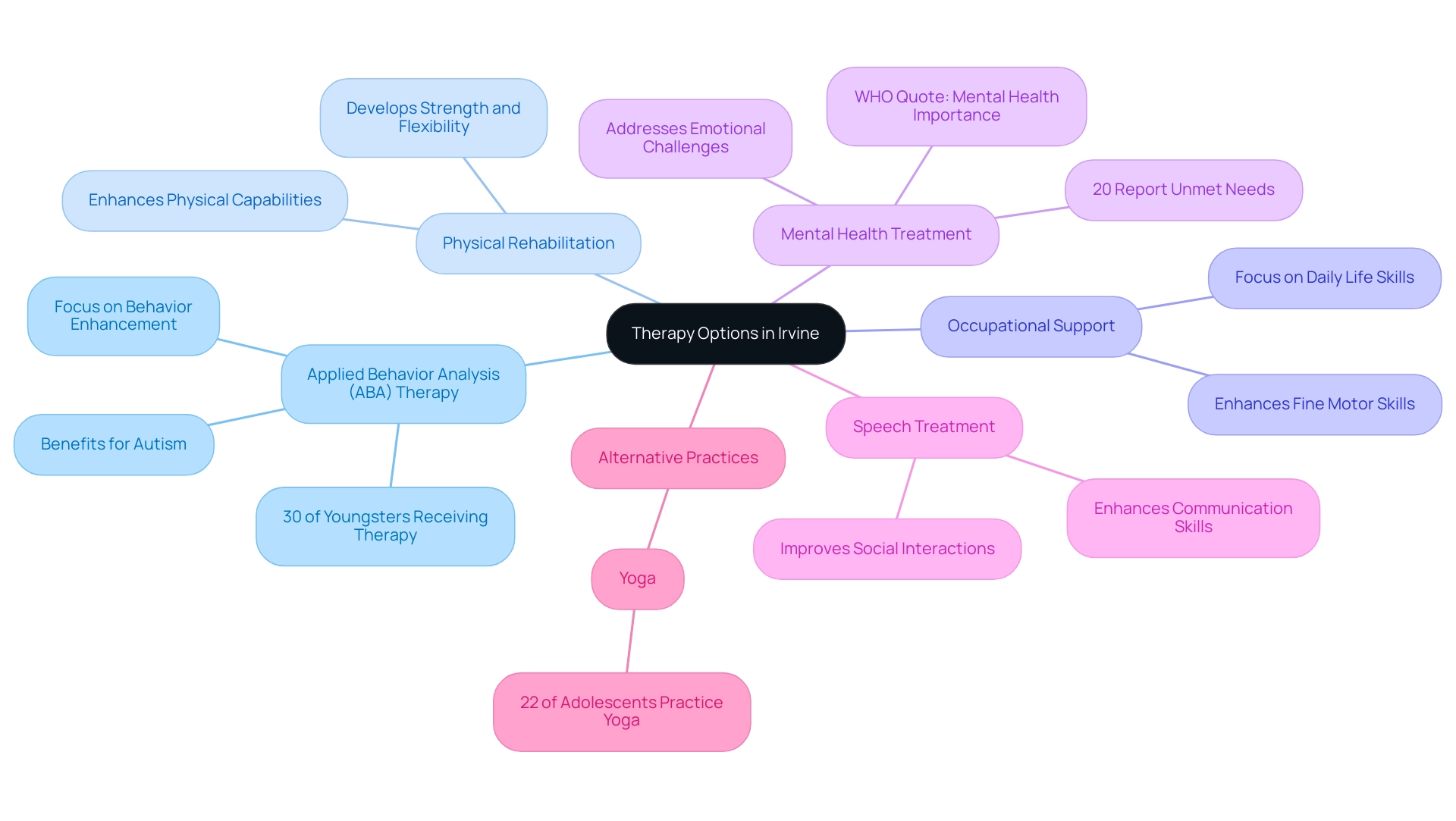
Physical Therapy Services for Children
In Irvine, therapy options encompass customized at-home ABA interventions aimed at enhancing youth behavioral and developmental abilities, offering essential support for families navigating these challenges. Notable resources available to parents include:
- Children's Hospital of Orange County (CHOC): Esteemed for its specialized pediatric therapy services, CHOC boasts a dedicated team of experts focused on the unique needs of children with autism and ADHD. Their approach incorporates the latest evidence-based practices, ensuring the best possible outcomes for young patients.
- SoCal Elite Physical Therapy: This facility offers tailored rehabilitation programs specifically designed for youth, emphasizing individual needs and goals. Their trained therapists work with a variety of conditions, fostering a supportive environment conducive to recovery.
- ICEC: The Irvine Center for Early Childhood (ICEC) is committed to treating youth with developmental delays. Their comprehensive services aim to enhance motor skills and overall physical function, promoting independence and confidence in young individuals.
When selecting a therapist, it is crucial for parents to prioritize those with expertise in pediatric care. Research indicates that specialized pediatric physical treatment can significantly boost recovery rates and improve long-term outcomes for children. For example, a recent study revealed that children receiving targeted treatment interventions exhibited a remarkable 30% improvement in mobility within just six months.
Moreover, applicants for counseling programs are required to complete 40 hours of clinical observation, highlighting the importance of qualified professionals in this field.
Success stories from facilities like CHOC showcase the transformative impact of these services. One family shared how their child, after participating in counseling sessions, achieved milestones they once thought were unattainable. Tumble-N-Dots, a local center, received heartfelt praise from parents who noted, "Tumble-N-Dots is an amazing center! Our autistic daughter attended their summer camp, and we were absolutely blown away by the progress she made." Such narratives underscore the significance of finding the right support for each individual's unique journey.
As trends in pediatric treatment evolve, it is vital for parents and advocates to stay informed about the latest advancements and therapy options in Irvine. Engaging with local resources empowers families to make informed decisions that enhance their child's development and well-being. Additionally, educational opportunities, such as the open house event for the Doctor of Physical Therapy program, provide invaluable insights into the field, fostering community engagement and awareness among parents seeking information.
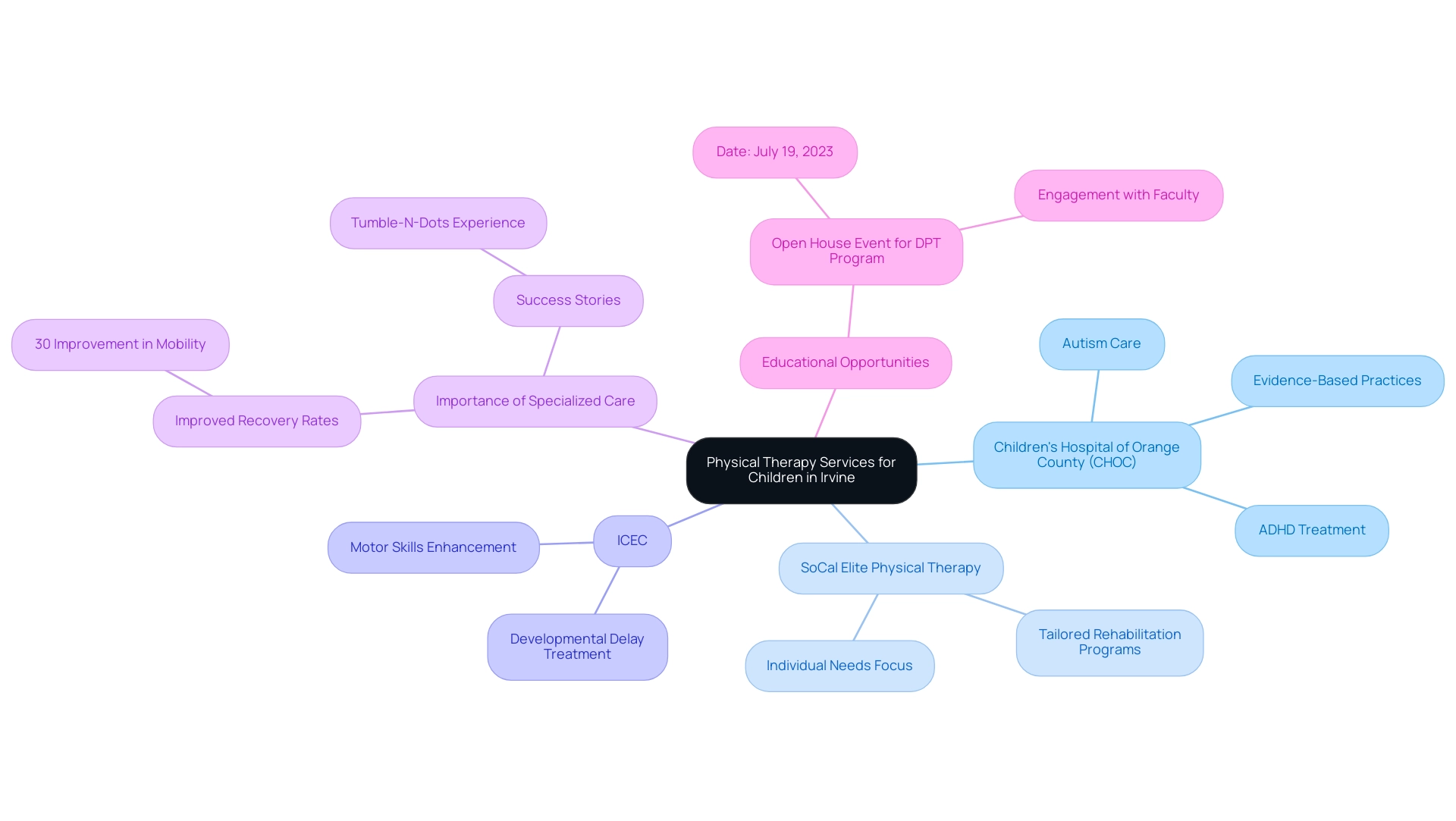
Understanding Occupational Therapy for Kids
Occupational support in Irvine is vital in addressing the diverse developmental challenges faced by youth. The comprehensive services offered are designed to foster growth in several key areas:
- Skill Development: Occupational therapy enhances fine motor skills, sensory processing, and self-care tasks, which are essential for daily functioning and independence.
- Social Skills Training: Therapists assist individuals in cultivating interpersonal skills, enabling effective communication and the building of meaningful relationships with peers.
- Adaptive Strategies: Children learn to adapt to their environments through tailored techniques, promoting greater independence and confidence in various settings.
Local providers, such as Tumble N' Dots and other therapy services in Irvine, are dedicated to developing personalized programs that meet each individual's unique needs. Tumble N' Dots, for example, has numerous success stories showcasing significant improvements in youth development through their specialized approaches. As we look ahead to 2025, the demand for therapy in Irvine remains strong, reflecting a growing recognition of the benefits of occupational therapy services.
Statistics indicate that sessions can range from 30 minutes once a week to multiple 60-minute sessions weekly, allowing for flexible support tailored to each individual's requirements.
Occupational therapists emphasize the importance of emotional regulation and focus improvement, utilizing adaptive techniques and tools to enhance the overall well-being of young individuals. As one occupational therapist noted, "Our specialty is the neuro-musculo-skeletal system, and our role is to educate patients on how to optimize the function of that system." This highlights the essential focus of treatment on enhancing young individuals' physical and emotional abilities.
As the job market for occupational therapists in the Irvine area continues to thrive, parents can look forward to enhanced access to skilled professionals who provide therapy in Irvine and are dedicated to promoting developmental success in youth.
Mental Health Therapy: Supporting Emotional Well-being
Therapy in Irvine plays a vital role in supporting youth who encounter emotional and behavioral challenges. These services are thoughtfully designed to address the diverse needs of young individuals, ensuring they receive the care and guidance they deserve. Key offerings include individual counseling, family therapy, and group therapy, each tailored to foster emotional well-being.
- Individual Counseling provides customized sessions that focus on specific emotional issues, allowing children to explore their feelings in a safe and nurturing environment.
- Family Therapy engages family members in the therapeutic process, enhancing communication and strengthening relationships, which fosters a supportive home atmosphere.
- Group Therapy creates a nurturing space for young individuals to share their experiences and learn from peers, promoting social skills and emotional resilience.
Recent statistics reveal that approximately 20% of youth in California experience emotional challenges, underscoring the urgent need for effective mental health support. National surveys, such as the National Health and Nutrition Examination Survey, further highlight the prevalence of mental health concerns among youth, emphasizing the significance of accessible support.
Success stories from various mental health initiatives illustrate the positive impact of these services. Young individuals who participated in group sessions reported significant improvements in their ability to express feelings and manage stress. Moreover, expert insights emphasize that early intervention is crucial; psychologists advocate for proactive mental health support to mitigate long-term emotional difficulties.
As we look toward 2025, therapy in Irvine continues to evolve, with an increasing focus on integrating community resources and volunteer engagement to enhance outreach efforts. This collaborative approach not only raises awareness but also strengthens the community's commitment to supporting youth's mental health. As Addie Zinone, Board Chair, poignantly states, "Mental illness impacts us all... where professional and compassionate assistance can only help."
The importance of mental health assistance for young individuals cannot be overstated; it lays the groundwork for their overall well-being and future success. Initiatives such as community outreach and volunteer involvement have proven to enhance the presence and support of mental health resources, illustrating the profound impact of collaborative efforts in addressing these challenges.
Specialized Therapies: Focus on ABA and Beyond
Specialized treatments, [[especially Applied Behavior Analysis (ABA), play a vital role in supporting young individuals with autism and ADHD. It's heartening to see that approximately 80% of youths with autism in California are benefiting from these services, reflecting a growing recognition of their importance. Key aspects of ABA therapy that bring hope include:
- Individualized Treatment Plans: Each plan is thoughtfully crafted to meet the unique needs and aspirations of the child, ensuring that interventions are both relevant and effective. Experts Peterson, Dodson, Hisey, Sherwin, and Strale emphasize, "Discrete Trial Training is an applied behavior analytic modality that simplifies complexity by taking large, gross tasks, reducing them to small, individualized tasks, and teaching them with straightforward and systematic methods."
- Behavioral Interventions: These interventions are designed to enhance communication, social skills, and daily living skills, all of which are crucial for the individual's overall development.
- Parent Training: Empowering parents with techniques to support their child's growth at home is a fundamental aspect of ABA intervention, fostering a collaborative approach to development.
A recent study on the reliability of ABA intervention measurements evaluated inter-observer reliability using a two-way random effects model, focusing on the consistency of measurements taken during ABA sessions. The study revealed an ICC (2) value of 0.929, indicating excellent agreement between raters, which reinforces the reliability of the observed effects of ABA interventions. This level of dependability is essential for ensuring that young individuals receive consistent and effective treatment.
Moreover, insights from specialists highlight the significance of personalized treatment strategies in therapy in Irvine, noting that such customized approaches lead to improved outcomes for children. As the field evolves, success stories illustrate the positive impacts of these specialized treatments on young people's lives, showcasing the potential for growth and development through dedicated support.
If you resonate with these experiences or have questions about how to navigate this journey, we encourage you to share your thoughts in the comments or reach out for support. Together, we can foster an environment of understanding and encouragement.
Navigating Therapy: A Parent's Guide to Choosing the Right Support
Navigating the therapy landscape can feel overwhelming for parents. However, with the right strategies, you can make informed decisions that truly benefit your child. Here are some essential tips to guide you in choosing the right support:
- Research Providers: Look for therapists who specialize in your child's specific needs, such as autism or ADHD. It's important to find professionals whose credentials and experience align with your child's challenges.
- Ask Questions: Don’t hesitate to inquire about the therapist's approach, qualifications, and experiences with similar cases. Understanding their methods can help you assess if they are a good fit for your child.
- Trust Your Instincts: The therapeutic relationship is crucial for success. Choose a therapist your child feels comfortable with; this can significantly enhance their engagement and progress in treatment.
- Consider Logistics: Think about practical aspects like the therapist's location, availability, and whether they accept your insurance. These factors can greatly impact your ability to maintain consistent treatment sessions.
Statistics show that many parents encounter challenges when selecting treatment providers, often feeling overwhelmed by the available options. In fact, most of the Parent Participation Engagement (PPE) improvement strategies have not been tested in usual care, underscoring the need for informed decision-making in treatment selection. Utilizing resources such as local directories and review platforms can simplify your search.
Websites like Psychology Today and Yelp provide valuable insights and reviews of therapists in your area, helping you make a more informed choice.
As Abigail Gewirtz, the Principal Investigator of a related study, pointed out, "The research reported here was funded by grant no. P20 MH 079906 from the National Institute of Mental Health to Gerald August and Abigail Gewirtz." This underscores the importance of relying on credible research to guide treatment choices.
Additionally, the case study titled 'Future Directions for PPE Research' emphasizes the need for consistent terminology and improved measurement in treatment options, offering a broader understanding of the challenges parents face.
By following these guidelines and considering the broader context of PPE, you can effectively explore therapy options in Irvine, ensuring that your child receives the support they need to thrive.
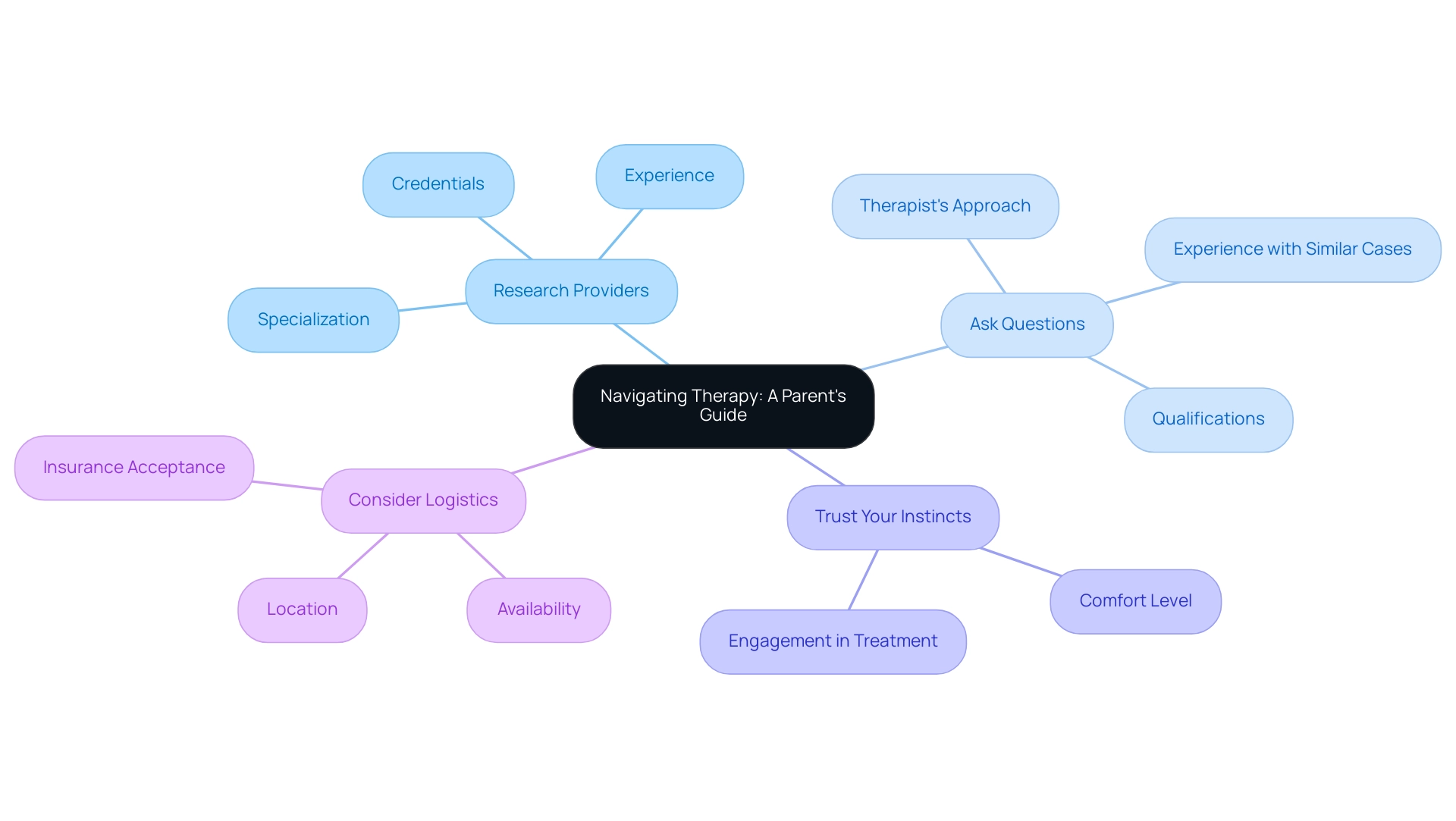
Community Resources: Building a Support Network for Families
Establishing a strong assistance network is essential for families navigating therapy options in Irvine. In this vibrant community, a variety of resources are available to support families on their journey:
- Irvine Family Resource Center: This center provides vital information and assistance tailored to families in need, helping them access necessary resources.
- Families Forward: Focused on addressing basic needs, Families Forward offers aid with housing, food, and counseling options, ensuring families have a stable foundation.
- Parent Support Groups: These groups create a space for parents to connect with others facing similar challenges, fostering an environment where experiences and advice can be shared.
- FOR Families: This confidential, free option for therapy in Irvine is available to residents, providing additional assistance and resources for families in need.
The impact of these networks is significant. For example, the Families and Communities Together (Fact) initiative has been assisting the Orange County community for over 29 years, offering support to more than 11,000 residents and 4,600 families in the last fiscal year (FY 2023-2024) alone. This encompasses over 63,610 referrals for various assistance options, demonstrating a strong commitment to preventing abuse and strengthening family units.
Additionally, the Olin Group focuses on improving business practices among nonprofits and fostering collaboration within the nonprofit community, further enhancing the resources available to families.
By leveraging these resources, families can empower themselves and enhance their networks, ultimately improving outcomes for their children undergoing therapy in Irvine.
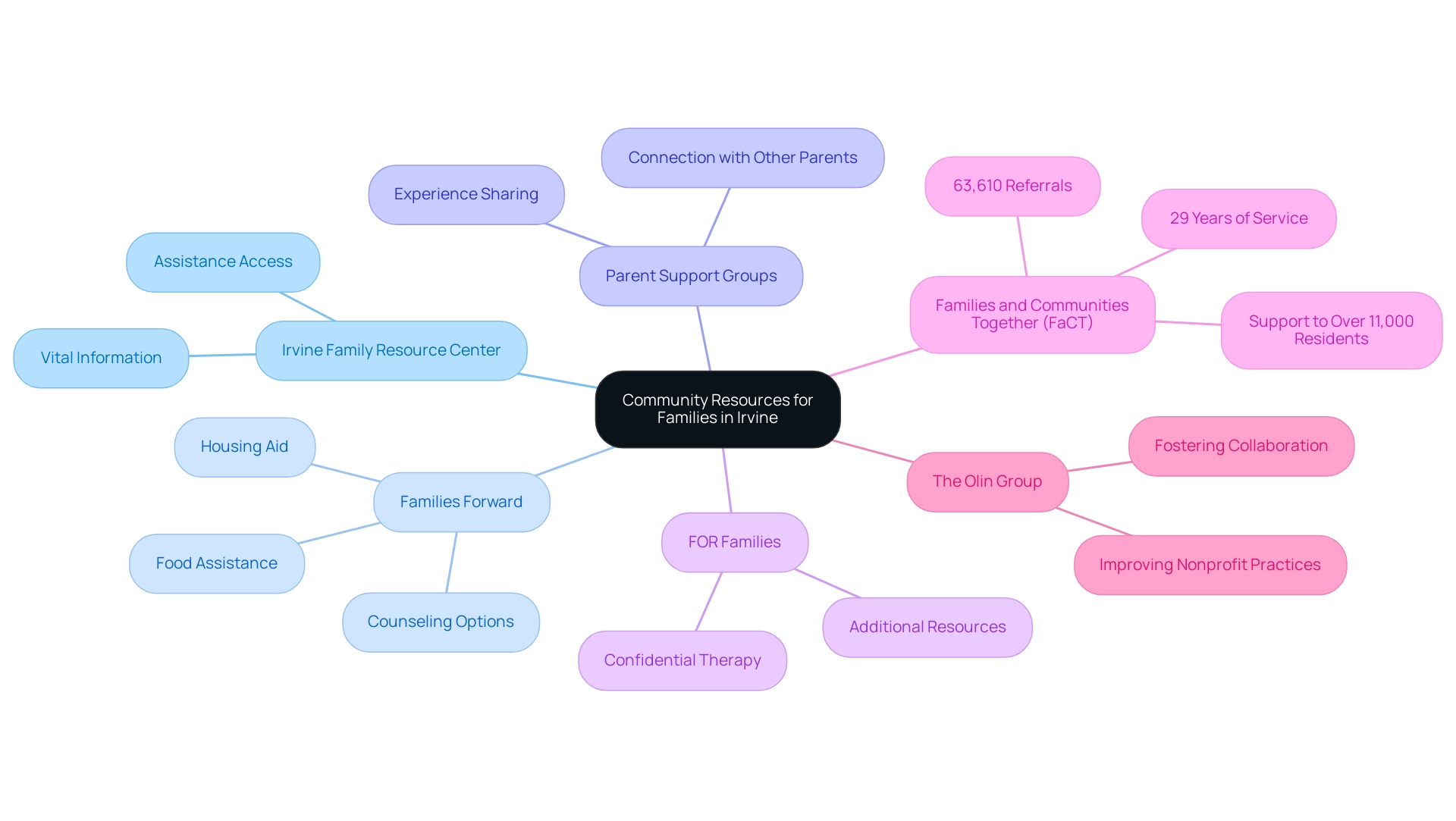
Accessing Therapy Services: Practical Steps for Parents
Obtaining therapy in Irvine requires a thoughtful approach to ensure that young individuals receive the support they truly need. Here are the essential steps to consider:
- Check Insurance Coverage: Start by verifying the specifics of your insurance plan. It's important to understand which treatment services are covered and to confirm whether the provider you are considering is in-network. This step is crucial, as insurance coverage can significantly influence out-of-pocket costs.
- Schedule an Appointment: Once you've identified a suitable provider, reach out to schedule an initial consultation. This meeting is vital for establishing a connection with the therapist and discussing your child's unique needs.
- Prepare Documentation: Gather all necessary documentation, including medical records and any previous assessments. Sharing this information can help the therapist tailor their approach to your child's specific circumstances, enhancing the effectiveness of the treatment.
- Follow Up: After the initial appointment, maintain regular communication with the therapist. Staying engaged in your child's treatment process is essential for achieving the best outcomes.
In Irvine, the average wait time for counseling appointments can vary, and it's wise for parents to be prepared for potential delays. A survey released in June 2017 highlighted that many families experience wait times extending several weeks, underscoring the importance of taking action early.
Professional guidance emphasizes the need for parents to be proactive in managing support options. Engaging with local assistance groups and resources can provide valuable insights and help navigate the complexities of insurance coverage and appointment scheduling.
A case study comparing private pay and Medicaid rates revealed significant discrepancies, with Medicaid reimbursement rates being approximately 40% lower than private pay rates. As Jane M Zhu from the Division of General Internal Medicine at Oregon Health and Science University noted, "We also find significant reimbursement rate differentials, with Medicaid rates 40% lower than reported private pay rates." This highlights the financial landscape parents must navigate when seeking support for their children.
By following these steps and leveraging available resources, including the unique community support fostered by ASD Media, parents can effectively streamline the process of accessing essential therapy in Irvine for their children.
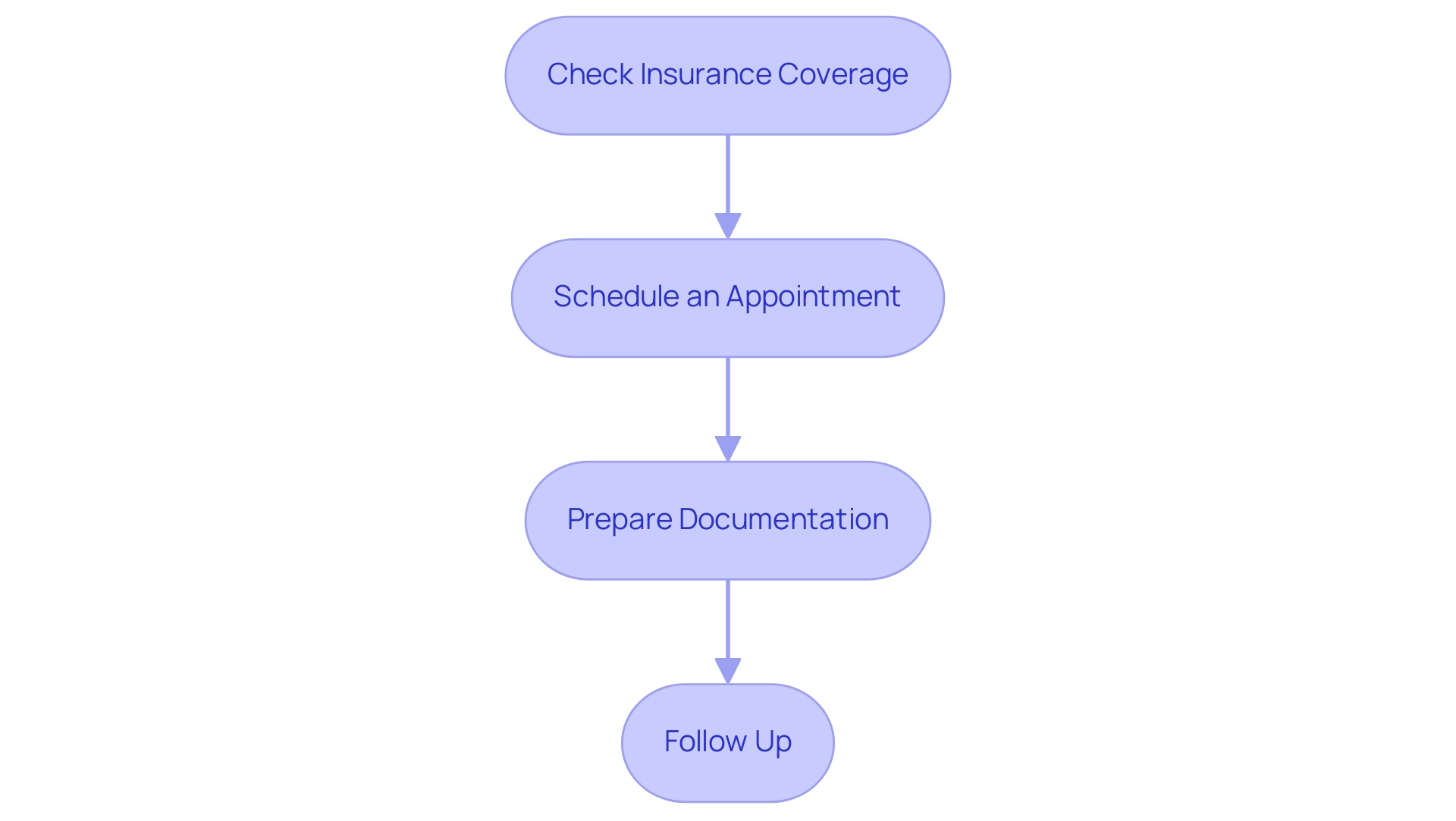
Conclusion
The diverse array of therapy options available in Irvine shines as a beacon of hope for families eager to support their children's development and emotional well-being. From Applied Behavior Analysis (ABA) to physical, occupational, and mental health therapies, parents can access specialized services tailored to the unique needs of their children. Each therapeutic approach plays a vital role in fostering essential skills, enhancing communication, and promoting overall health, ultimately contributing to the growth and independence of young individuals.
As awareness of mental health issues continues to rise, the importance of early intervention is more crucial than ever. Statistics reveal that many children face emotional challenges, reinforcing the necessity for accessible and effective mental health support. Community resources, such as parent support groups and local initiatives, empower families, creating a robust support network that enhances the therapy experience.
Navigating the therapy landscape may feel daunting, but with informed decision-making and the right resources, parents can effectively choose the best options for their children. By prioritizing research, trusting their instincts, and leveraging community support, families can ensure their children receive the comprehensive care they need to thrive. The collective efforts of healthcare providers, therapists, and families pave the way for a brighter future, where every child has the opportunity to reach their fullest potential. Together, let us continue to advocate for our children and ensure they have the support they deserve.
Frequently Asked Questions
What therapy options are available for children in Irvine?
In Irvine, parents can choose from various therapy options including Applied Behavior Analysis (ABA) Therapy, Physical Rehabilitation, Occupational Support, Mental Health Treatment, and Speech Treatment, each designed to meet the unique needs of children.
What is Applied Behavior Analysis (ABA) Therapy and its benefits?
ABA Therapy is an evidence-based approach that focuses on enhancing specific behaviors and skills, particularly for children with autism. Research shows that early intervention through ABA can significantly improve communication, social skills, and daily living activities.
How does Physical Rehabilitation assist children?
Physical Rehabilitation aims to enhance physical capabilities and mobility in young individuals facing movement and coordination challenges, helping to develop strength, flexibility, and overall physical health.
What is the purpose of Occupational Support for children?
Occupational Support helps children gain essential skills for daily life and academic success by focusing on fine motor skills, sensory processing, and self-care abilities, fostering independence and confidence.
How does Mental Health Treatment support youth?
Mental Health Treatment addresses emotional and behavioral challenges, providing essential support for youth dealing with issues like anxiety and depression. Early intervention is critical for effective treatment.
What role does Speech Treatment play for children?
Speech Treatment is designed to improve communication skills, helping children articulate their thoughts and feelings effectively, which enhances social interactions and academic performance.
Are there alternative practices that complement traditional therapies?
Yes, alternative practices such as yoga are becoming popular, with 22% of adolescents reporting they practiced yoga in the past year, contributing to holistic well-being alongside conventional treatments.
What local resources are available for pediatric therapy in Irvine?
Notable resources include Children's Hospital of Orange County (CHOC), SoCal Elite Physical Therapy, and the Irvine Center for Early Childhood (ICEC), each offering specialized services for children with various needs.
Why is it important to choose therapists with pediatric expertise?
Selecting therapists with expertise in pediatric care is crucial as research indicates that specialized treatment can significantly improve recovery rates and long-term outcomes for children.
What success stories highlight the effectiveness of therapy services in Irvine?
Success stories from facilities like CHOC and Tumble-N-Dots showcase transformative impacts, such as children achieving previously unattainable milestones and significant progress in their development.
How can parents stay informed about advancements in pediatric treatment?
Parents can stay informed by engaging with local resources, attending educational opportunities, and participating in community events that focus on the latest therapy options and advancements.




